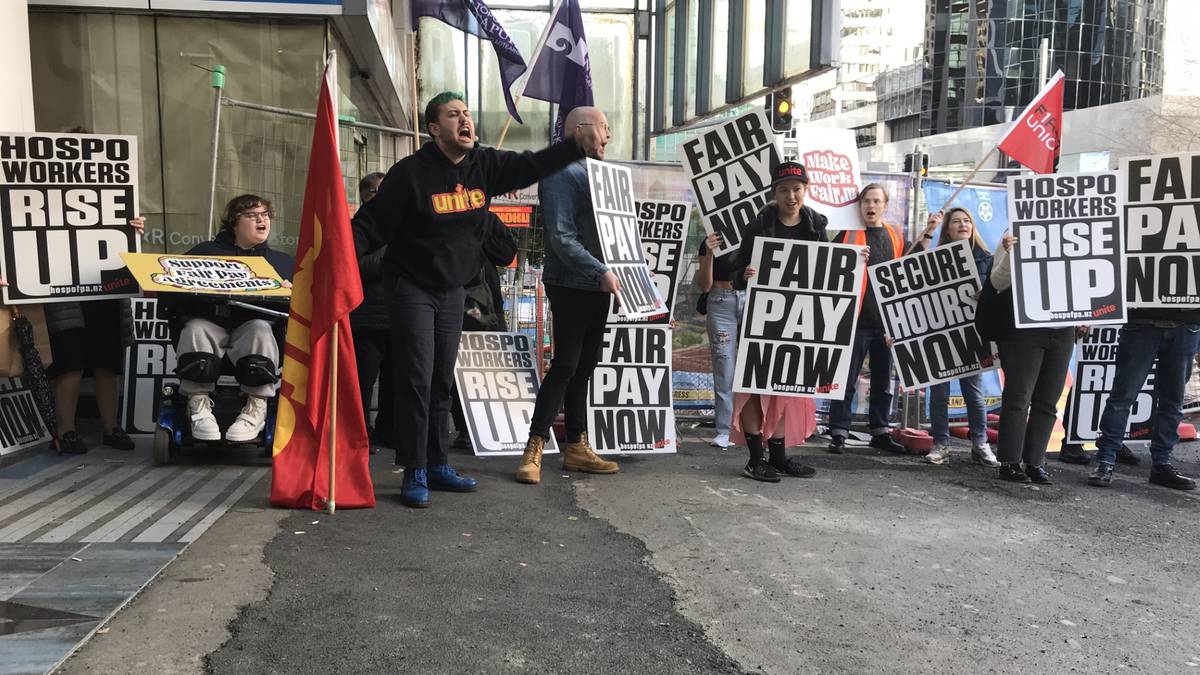Members of Unite union and supporters protested outside the President Hotel in Victoria St West, Auckland, on Thursday afternoon, saying management had pressured staff to opt out of fair pay agreements. Photo / John Weekes
OPINION
The vision of a dignified life for all is a simple one. Dignity as a person, a partnership, a household, a family, a hapū, a business, a town, an iwi, a city, a nation. Whatever our background, socio-economic position or aspirations, we can all agree on this at least.
The United Nations Declaration on Human Rights drafted in 1948, initially by 50 countries including us and now signed by all UN member nations, says every person has inherent dignity, born free and equal. Dignity is realised throughout a child’s or an adult’s life when it is accompanied by equality, freedom, and justice.
We all have the right to an adequate standard of living including food, clothing and housing. Everyone also has the right to social security and just and favourable conditions of work. These rights are essential to achieving other economic, social and cultural rights, such as the rights to health and education.
It is hard to feel dignity when one is always hungry (at least 120,000 kids in Aotearoa live in hardship), living in fear (74 per cent of all homicide victims killed by a partner are female, 26 per cent male), jobless or not enough paid hours despite all efforts; being denied equal opportunities because of colour, gender, sex, or disability; homeless or living in insecure arrangements; or at risk of losing a business that your family and workers have built and depend on.
/cloudfront-ap-southeast-2.images.arcpublishing.com/nzme/NYW54R6AP5DA7JDC44LGUITDTA.jpg)
It is the job of those who design (shout out to the backroom) and establish (prize to the loudest MP) macro policies, business practices, and leaders at all levels who know exactly how dignity feels, how much it costs emotionally, spiritually and materially; to remember to fight tooth and nail for the dignity of everyone from the least visible to the more influential cohorts.
The rush by our new Government to repeal the Fair Pay Agreements (FPA) Act and extend 90-day trial periods to all employers (with no ability to challenge an unfair dismissal during the trial) will negatively affect vulnerable workers, particularly women, Māori, Pacific people, disabled people and young people. This will immediately negate years of appeals from large communities of low-paid workers for a new framework that will ensure fair pay, guaranteed hours of work, upskilling (we want increased productivity) and relevant health and safety provisions. Rushing the legislation through “under urgency” will mean there is no chance for dialogue with these communities and no chance for a public discussion.
By 2028, Kiwis who are 65 years and over will outnumber children under 15 years; the group in the middle are the bulk of the workforce. Guess what? It is the parents and caregivers of these children who will be denied basic protections by removing the FPA Act and extending 90-day trial periods to all employers. Among these parents and caregivers are cleaners, supermarket workers, security guards, hospitality workers and health workers; largely people of colour, youth and women. Many of these workers were the people who put themselves and their whānau at risk to keep the country running during the Covid-19 lockdowns. Now they are being denied the opportunity to secure fair working conditions to achieve a better future for themselves and their families.
We want an Aotearoa where children do not experience poverty, where people pay fair rents, can afford healthy kai and live in healthy and secure homes. Being, hungry, cold, in precarious work or jobless – or for some, living in hopelessness, is not the Aotearoa New Zealand we want. Where is the consideration of dignity, equality, freedom, and justice?
Te Kāhui Tika Tangata Human Rights Commission’s purpose is to strive for “he whakamana tāngata, a life of dignity for all”. Our role is one of service and independence, not to be popular nor to be subservient. This includes shedding light through information and public campaigns on human rights. Doing so helps to give voice to those on the margins, including calling on Governments, politicians and business leaders to uphold the law, and respect duties under domestic and international law to protect, respect and uphold the human rights of all our people.
Ia manuia
Saunoamaali’i Karanina Sumeo is a Samoan-born New Zealand civil servant. In 2018 she was appointed EEO (Equal Employment Opportunities) Commissioner for the New Zealand Human Rights Commission.




 Stocks of Paxlovid antiviral for Covid-19 run dry amid New Zealand’s fifth virus wave
Stocks of Paxlovid antiviral for Covid-19 run dry amid New Zealand’s fifth virus wave